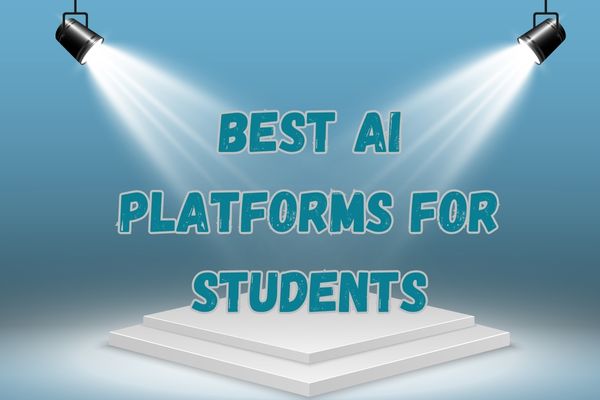6 Best AI Platforms for students

Here is Best AI Platforms for students. Many sectors have been significantly impacted by recent developments in artificial intelligence. Because it can improve students’ learning outcomes artificial intelligence in education has a lot of potential. Top artificial intelligence learning resources for students will be discussed in this post.
Best AI Platforms for students
| Tool | Description | Platform | Features |
|---|---|---|---|
| Grammarly | AI-powered writing assistant | Web, Mobile | Grammar and spell-check Plagiarism checker Tone detection Writing suggestions Integration with multiple platforms |
| StudyBlue | Study tool for creating and sharing digital flashcards | Web, Mobile | Flashcard creation and sharing Study reminders Study statistics Study guides Q&A forums |
| Duolingo | Language-learning platform | Web, Mobile | Gamified learning experience Interactive lessons Speech recognition Personalized learning Language proficiency tests |
| Wolfram Alpha | Computational knowledge engine | Web, Mobile | Answer engine Step-by-step solutions Data analysis Graphing Statistical analysis Math tools |
| Coursera | Online education platform offering courses and degrees | Web, Mobile | Courses and degree programs from top universities Professional certificates Personalized learning Peer assessments Discussion forums |
| TED-Ed | Educational platform featuring animated videos and lesson plans | Web | Animated videos Lesson plans Quizzes Interactive discussions, Educational content for learners of all ages |
Grammarly
Grammarly is one of the most well-liked AI tools for students. Students can enhance their writing skills by using Grammarly, an AI-powered writing assistance. A tool for grammar, spelling, punctuation, and sentence structure checks is called Grammarly. It also offers suggestions on how to generally make writing easier to read.
For usage in online browsers or as a desktop application, Grammarly features a free edition. Grammarly’s premium version includes extra tools including plagiarism detection, thorough grammatical checks, and recommendations for enhancing tone and clarity.
Pros:
- Helps users to improve their writing skills and produce error-free content.
- Offers suggestions for tone, clarity, and concision.
- Provides users with a plagiarism checker.
- Available on multiple platforms.
Cons:
- The free version has limited features.
- Users may become over-reliant on the software and neglect to develop their own writing skills.
- Can sometimes provide incorrect suggestions or flag content that is actually correct.
StudyBlue
It is an AI-powered study platform that enables students to make quizzes, study materials, and flashcards to aid with test preparation. StudyBlue analyses a student’s learning habits and offers individualised study advice using artificial intelligence.
A sizable catalogue of study materials made by other users is accessible in StudyBlue’s free version. StudyBlue’s premium version comes with extra features like the capacity to design unique study materials, access to a wider collection of study resources, and the capacity to monitor progress and get tailored study advice.
Pros:
- Provides an easy way to create and share digital flashcards.
- Offers a variety of study tools and features.
- Allows users to track their progress and see study statistics.
- Has a community of users who can share study materials and help answer questions.
Cons:
- The quality of study materials can vary based on user-generated content.
- The platform may not work for all learning styles.
- Some users may find the interface cluttered and difficult to navigate.
Duolingo
An AI-powered language learning program called Duolingo makes learning a new language enjoyable and interesting by utilising gamification. AI is used by Duolingo to monitor students’ progress and modify the level of difficulty of the classes based on their performance.
A free version of Duolingo gives users access to introductory language lessons in a number of different languages. Duolingo Plus, premium edition of the language learning app, has extra features including offline lesson access and ad-free learning.
Pros:
- Provides a fun and interesting method for learning a new language.
- Offers each user a set of personalised learning routes.
- Enables individuals to practise their speaking, listening, reading, and writing abilities.
- Ad-free and freely accessible.
Cons:
- For certain users, it might not be as effective as more conventional language learning techniques.
- Only provides a few different languages.
- Can get boring and maybe not difficult enough for more advanced students.
Wolfram Alpha
It’s an artificial intelligence-powered computational knowledge engine. Numerous academic settings can benefit from its use. It can convey knowledge on
- A range of topics
- Resolve mathematical problems
- And create charts and graphs
Web browsers have a free version of it available. It offers countless computational and knowledge-based features. The upgraded version of Wolfram Alpha is Wolfram Alpha Pro. You can:
- Upload data for analysis
- You have access to more advanced computational tools
- And you can get step-by-step math solutions
- Among other advantages
Pros:
- Gives precise, thorough responses to complex questions.
- Provides a vast array of scientific and mathematical instruments.
- Can be applied to graphing and data analysis.
- Connects to further platforms.
Cons:
- For people without a strong background in maths and physics. It might not be user-friendly.
- Only functions that are included in a subscription fee are accessible.
- For research papers or other sorts of writing, might not be as successful.
Coursera
Some of the world’s top colleges and universities offer courses on Coursera, an online learning platform. Coursera uses AI to customise the learning experience for each student based on their own learning preferences.
The free edition of Coursera offers access to a limited number of courses. The premium version of Coursera, Coursera Plus, offers access to over 3,000 courses and specialisations in addition to features like unlimited course certifications and personalised learning recommendations.
Pros:
- Offers a wide range of courses and degree programs from top universities.
- Allows users to learn at their own pace and on their own schedule.
- Provides users with professional certificates upon completion.
- Has a global community of learners.
Cons:
- Can be expensive for some users.
- May not be as effective as in-person learning for some subjects.
- Some courses may require prerequisites or previous knowledge.
TED-Ed
It is an educational portal powered by AI. It offers a vast library of tutorial videos and lessons on a variety of topics. It uses AI to customise each student’s educational experience based on their particular learning preferences.
Unrestricted version of TED-Ed provides access to a sizable archive of educational lessons and films. TED-Ed Clubs, the premium version of TED-Ed, offers additional features like access to premium content, ability to create and share educational content, and ability to communicate with other students.
Pros
- Provides age-appropriate, interesting educational content.
- Offers lesson ideas and aesthetically engaging animated videos.
- Stimulates creativity and critical thinking.
- Anyone with an internet connection can use it for free.
Cons:
- Possible lack of effectiveness for deep learning.
- Some videos might not go into as much information about a subject as other sites.
- Possibly not as interactive as other teaching resources.
Read more:






